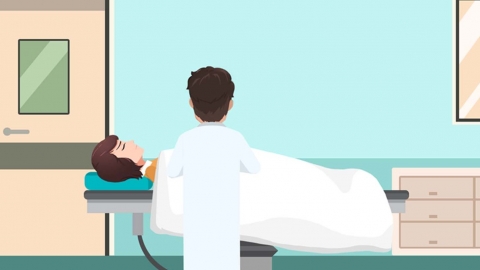What does it mean to see a large cystic low-density shadow in the abdominal and pelvic cavity?
A large cystic low-density shadow is observed in the abdominal and pelvic cavity, which may be caused by physiological ovarian cysts, physiological fluid accumulation in the abdominal cavity, serous ovarian cystadenoma, inflammatory pelvic mass, enterogenous cysts, etc. The condition can be managed through regular observation, lifestyle adjustments, medication, or surgical intervention. If abdominal pain or bloating worsens, prompt medical attention is necessary.
1. Physiological ovarian cyst: These cysts form due to cyclical changes in the ovaries of women of reproductive age. They are usually unilateral and filled with clear fluid, often causing no obvious symptoms. Regular ultrasound follow-up is recommended to monitor changes. Avoid strenuous exercise, maintain a balanced diet, and no specific treatment is generally required as they often resolve spontaneously.
2. Physiological fluid accumulation in the abdominal cavity: Small amounts of normal peritoneal fluid may temporarily accumulate due to changes in body position or metabolism, forming a localized cyst-like image, typically without discomfort. It is advised to avoid prolonged sitting or lying down, engage in moderate activity to promote fluid absorption, maintain a light diet, and undergo regular ultrasound复查.

3. Ovarian serous cystadenoma: Formed by abnormal proliferation of ovarian epithelial cells, these cysts contain serous fluid and may cause symptoms such as lower abdominal fullness or abdominal enlargement. Under medical guidance, medications such as cefixime dispersible tablets, metronidazole tablets, and Gynecological Qianjin tablets may be used to alleviate symptoms.
4. Inflammatory pelvic mass: Chronic pelvic inflammation leads to tissue adhesions and encapsulated fluid, forming a cystic mass, often accompanied by dull lower abdominal pain and soreness in the lumbosacral region. Under medical guidance, medications such as levofloxacin hydrochloride capsules, cefuroxime axetil tablets, and Fuyankang tablets may be used to improve symptoms.
5. Enterogenous cyst: Arising from residual embryonic intestinal mucosal tissue, these cysts contain mucus-like fluid and may present with abdominal pain and bloating. Follow medical advice to use medications such as amoxicillin capsules, ornidazole dispersible tablets, and ibuprofen sustained-release capsules to relieve symptoms.
Maintain a regular作息, avoid fatigue, eat a light and easily digestible diet, engage in appropriate gentle exercise, practice good personal hygiene, and have regular follow-up imaging to monitor lesion changes, all of which support recovery.




